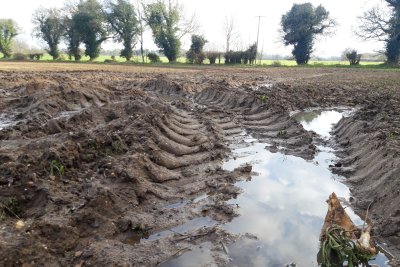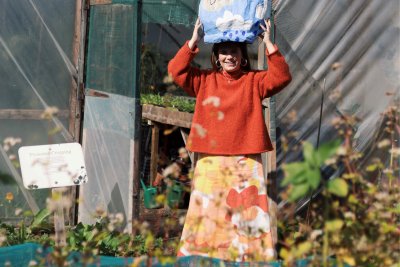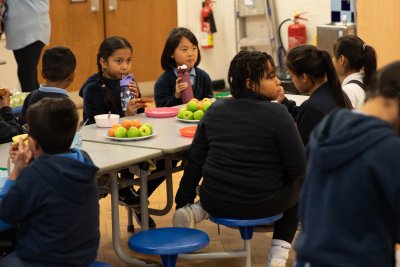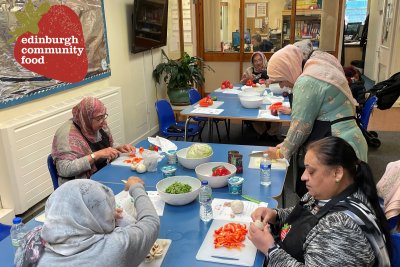Sustain's latest report 'Response, Resilience and Recovery: London's Food Response to Covid-19' - sets out how councils build resilience through their approach to food issues, highlighting five councils for their leadership in food growing. Here Fiona McAllister looks closely at how these councils are leading the way to ensure all Londoners have a chance to grow their own food.
We already know growing your own food is good for you. Not only does it provide acess to healthy food (almost) on your doorstep, it’s also good for your physical and mental health. A recent study from Sheffield University outlined the wellbeing benefits of growing food in the city emphasizing mental health, connectedness and growing also as a means to address food insecurity. While we know all of this intuitively it's great to see the evidence stacking up and we welcome it all (check out Growing Health).
It’s no wonder, then, that since the beginning of the pandemic, up and down the country, we’ve seen a spike in interest in growing our own food, seen early on by growth in sales of seeds and compost as well as reports from national charities such as Garden Organic and the RHS. A new study from Imperial College London further demonstrates London’s urban food growing revival finding that Londoners’ demand for food growing spaces is outstripping shrinking availability. In fact, the provision of allotment space would need to increase by almost 80% to address current waiting lists.
A few weeks into the pandemic it was clear that this resurgence of food growing was more than self-interest – many growers were mobilizing to grow and donate harvests to the people who needed fresh and affordable food the most. So how are councils enabling the resilience and connectedness found through the act of growing and sharing food, and what more needs to be done?
Creating fertile foundations
When asking the above question, it is critical to look at what local authorities were already doing to support food growing before the pandemic to create and offer opportunities for people to grow food, increase numbers of growing spaces and protect existing food growing land.
For the last 10 years Capital Growth has been measuring the critical role London’s councils play as part of the Good Food for London report, reviewing planning policies through to practical support. In this year’s report we highlighted Greenwich, Islington, Southwark, Tower Hamlets and Waltham Forest as showing leadership before and during the pandemic. We saw that by working to support their food growers and enabling organisations, they have been able to build on this to enable people to continue to grow and to take swift and meaningful responses during Covid-19.
These councils have embedded their commitment to food growing through including in strategies or developing targeted food growing plans or strategies. The Royal Borough of Greenwich for example, is identifying new community growing spaces within existing parks, estates and other land owned by the council as part of their plan. And this isn’t the only plan supporting their ambitions; their Local Plan also recognizes that food growing is “important, not only in helping to provide people with healthy local food, but also because it involves exercise, fresh air and interaction with the natural environment which has proven to be positive for mental well-being.”
Waltham Forest have included food growing in their approach to improving public health through their Health and Wellbeing strategy and a new Food Strategy. As part of this work, they are one of nine boroughs proactively working to increase the amount of land available to grow food and mapping the borough to identify more land and assets to create more food growing opportunities for its residents. This builds on their long-standing relationship with Organiclea, who have a long lease on the council's former plant nursery to grow organic food at scale and provide training for hundreds of residents each year.
Of the councils surveyed, 18 refer to funding available to food growing projects, with many also leading on the creation of new sites or orchards. Southwark Council is one such borough with a long history of practical support to its food growing groups, having worked with Garden Organic to create a network of master gardeners and funding numerous sites through the Cleaner Greener Safer programme. The council has now gone one step further as part of a Council commitment to launch an Allotment Expansion Guarantee programme, with the appointment of two Community Gardening Coordinators. They supports residents to set up new food growing and community gardening spaces, alongside supporting existing community gardens and gardeners.
Reaping rewards: community response during COVID-19
These are just a few examples, but across the board the survey showed that the right foundations enabled quick and appropriate responses. For example, Tower Hamlets proactively supported its residents to continue to grow food throughout the pandemic, signposting to guidelines and resources to operate safely. Through their longstanding partnership with Wen, they also supported a Keep Growing campaign, involving the Tower Hamlets Food Partnership and distributing growing packs to 700 people, as well as training videos and online events.
Waltham Forest was able to mobilise its community of willing and able food growers to volunteer as part of the collective effort to feed those in need led by Groundwork, as well as fund online courses for community food growing sites led by Organiclea.
There was also good practice outside of the councils already mentioned. Although many food growing spaces closed or reduced activities, many councils recognised the role community gardens can (and want to) play in responding to the crisis through growing and donating healthy food. In total 15 councils supported community gardens to continue to grow food and 11 went further to connect growers with local food providers including foodbanks. For example, Bexley and Barnet Councils connected allotment holders to voluntary sector organisations working on the ground to distribute food parcels.
Read related blog: Why it’s critical to keep our community gardens and allotments growing during Coronavirus
What next: planting seeds of hope
The councils showing leadership during the pandemic, had already recognised the role that food growing can play and were embedding their support to realise this. Therefore, it was no surprise that they included food growing in recovery planning, acknowledging the potential for food production as well as to improve wellbeing and access to nature.
For example, Royal Borough of Greenwich are strengthening their food growing offer, including the opportunity for a social prescribing through their borough-wide service and associated public health commissions. These councils had also made links with public health, for example Tower Hamlets council, through their VCS partner, Wen, ran Live Well workshops on growing and cooking for residents on a housing estate, exploring the connection between food and mental health, switching to online methods when Covid-19 hit.
But most heartening, this year seems to have planted the seeds (or added the organic matter) for many more local authorities to really explore how to harness the energy and opportunity that food growing and food growers create. Whether the motivation is health, climate, biodiversity, skills or reducing isolation, we know food growing can tick all these boxes and councils can and have helped residents to engage.
Many councils in the capital and beyond have stepped up during the pandemic to support residents to keep growing food. We now want to support more councils to embrace this opportunity and look across their land, other assets, as well as services and strategies to see how they can give all residents equal access to land, find out where support is needed for community champions or voluntary sector, and how they can tie in growing with other council objectives and teams for a joined up approach.
This year even more Londoners have woken up to the fact that access to green spaces, and in particular the chance to grow food is more important than ever. Now one of our biggest tasks is to provide the opportunities through protecting growing spaces, as well as find new ones, to ensure all Londoners regardless of age, ability or postcode, have opportunities to grow their own food. No mean feat, we know, and something we cannot do without the support and leadership of our local councils.
The councils recgnised for demonstrating leadership in food growing before and during the pandemic are the following: Greenwich, Islington, Southwark, Tower Hamlets and Waltham Forest. In addition, Lewisham demonstrated leadership before the pandemic, and Lambeth demonstrated leadership during the pandemic. Full report here
If you are looking for support to make contact with your local council in relation to accessing land for food, or work in a council and what to support more people to grow, then get in touch with the Capital Growth team.
Published Tuesday 24 November 2020
Sustain: Sustain The alliance for better food and farming advocates food and agriculture policies and practices that enhance the health and welfare of people and animals, improve the working and living environment, enrich society and culture and promote equity.





